Analysis of Accounting and Financial Reporting for SCP
VerifiedAdded on 2023/01/23
|6
|1779
|53
Report
AI Summary
This report analyzes the financial reporting of Shopping Centre Australia Property Group (SCP), focusing on accounting regulations related to investment properties under IAS 40. It examines the flexibility of management in adapting to market changes, particularly in the volatile retail sector. The assessment highlights the impact of changes in the retail industry, such as rising fixed costs and stagnant sales, on SCP's financial statements, including potential effects on revenue, costs, and liquidity. It also explores the economic consequences of these changes, applying positive accounting theory to understand how SCP might respond. The report concludes by discussing strategies for the company to maintain profitability and competitiveness in the face of market challenges, such as digital operations and cost-cutting techniques. The analysis covers various aspects of the company's financials and provides insights into its operations and future strategies.
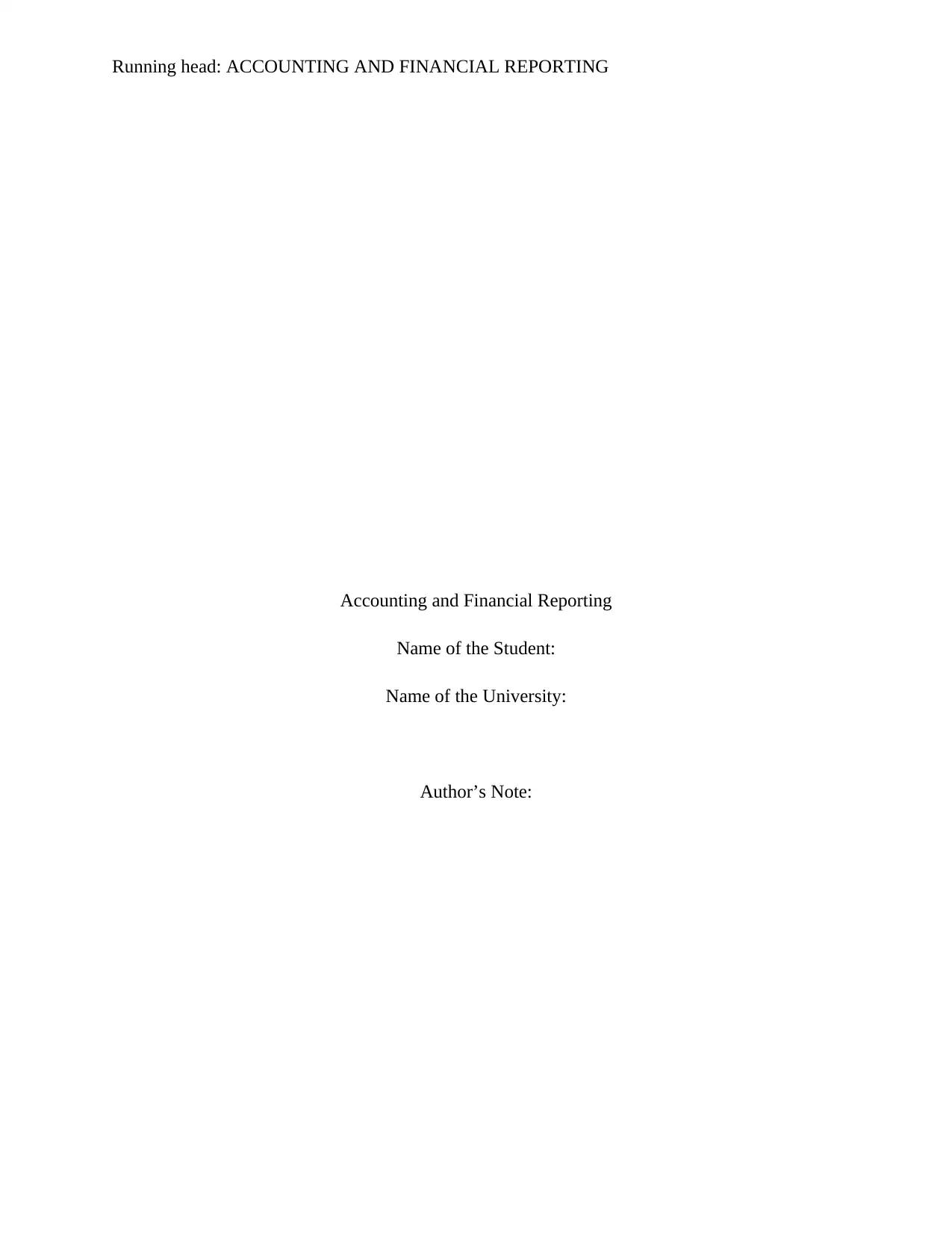
Running head: ACCOUNTING AND FINANCIAL REPORTING
Accounting and Financial Reporting
Name of the Student:
Name of the University:
Author’s Note:
Accounting and Financial Reporting
Name of the Student:
Name of the University:
Author’s Note:
Paraphrase This Document
Need a fresh take? Get an instant paraphrase of this document with our AI Paraphraser
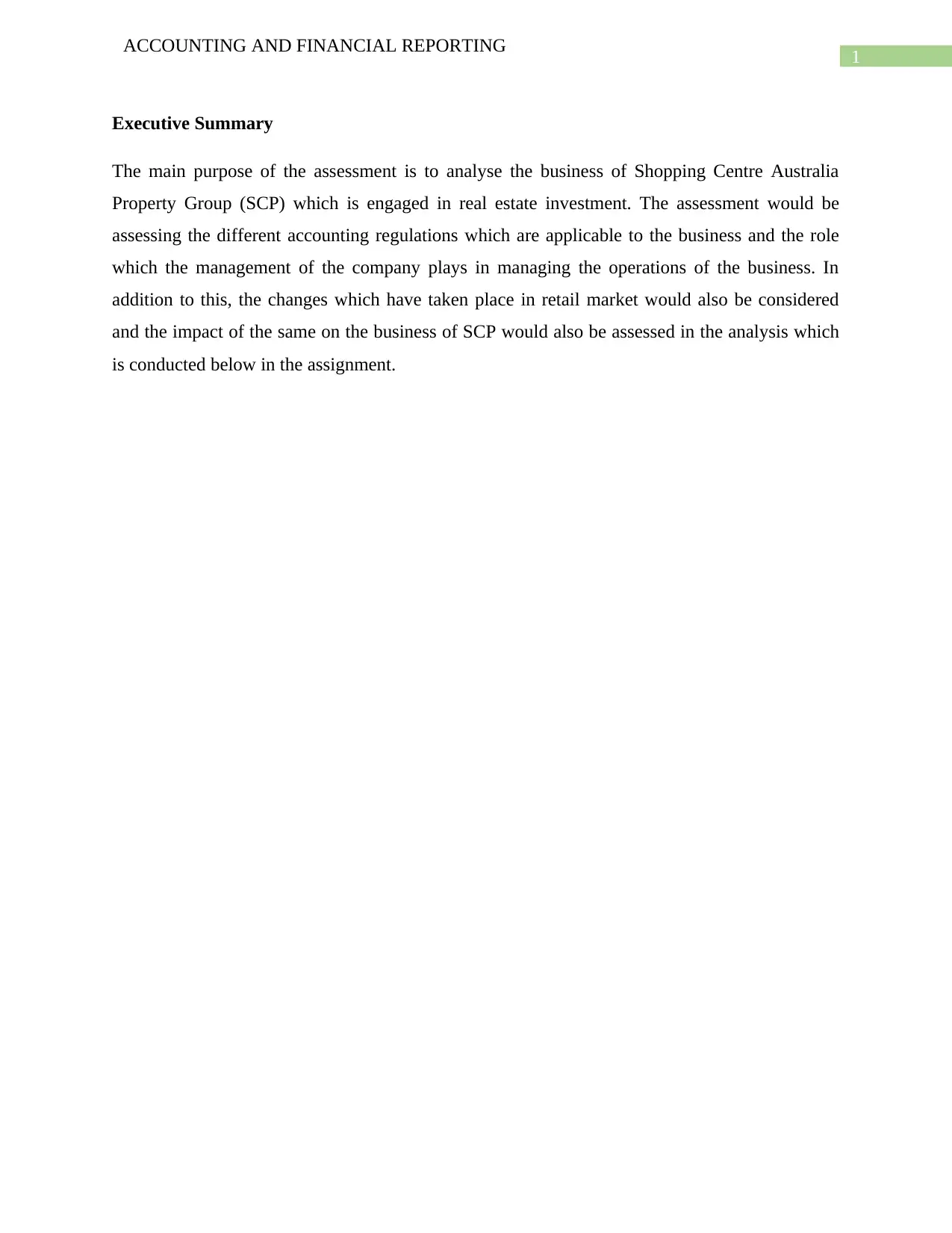
1
ACCOUNTING AND FINANCIAL REPORTING
Executive Summary
The main purpose of the assessment is to analyse the business of Shopping Centre Australia
Property Group (SCP) which is engaged in real estate investment. The assessment would be
assessing the different accounting regulations which are applicable to the business and the role
which the management of the company plays in managing the operations of the business. In
addition to this, the changes which have taken place in retail market would also be considered
and the impact of the same on the business of SCP would also be assessed in the analysis which
is conducted below in the assignment.
ACCOUNTING AND FINANCIAL REPORTING
Executive Summary
The main purpose of the assessment is to analyse the business of Shopping Centre Australia
Property Group (SCP) which is engaged in real estate investment. The assessment would be
assessing the different accounting regulations which are applicable to the business and the role
which the management of the company plays in managing the operations of the business. In
addition to this, the changes which have taken place in retail market would also be considered
and the impact of the same on the business of SCP would also be assessed in the analysis which
is conducted below in the assignment.
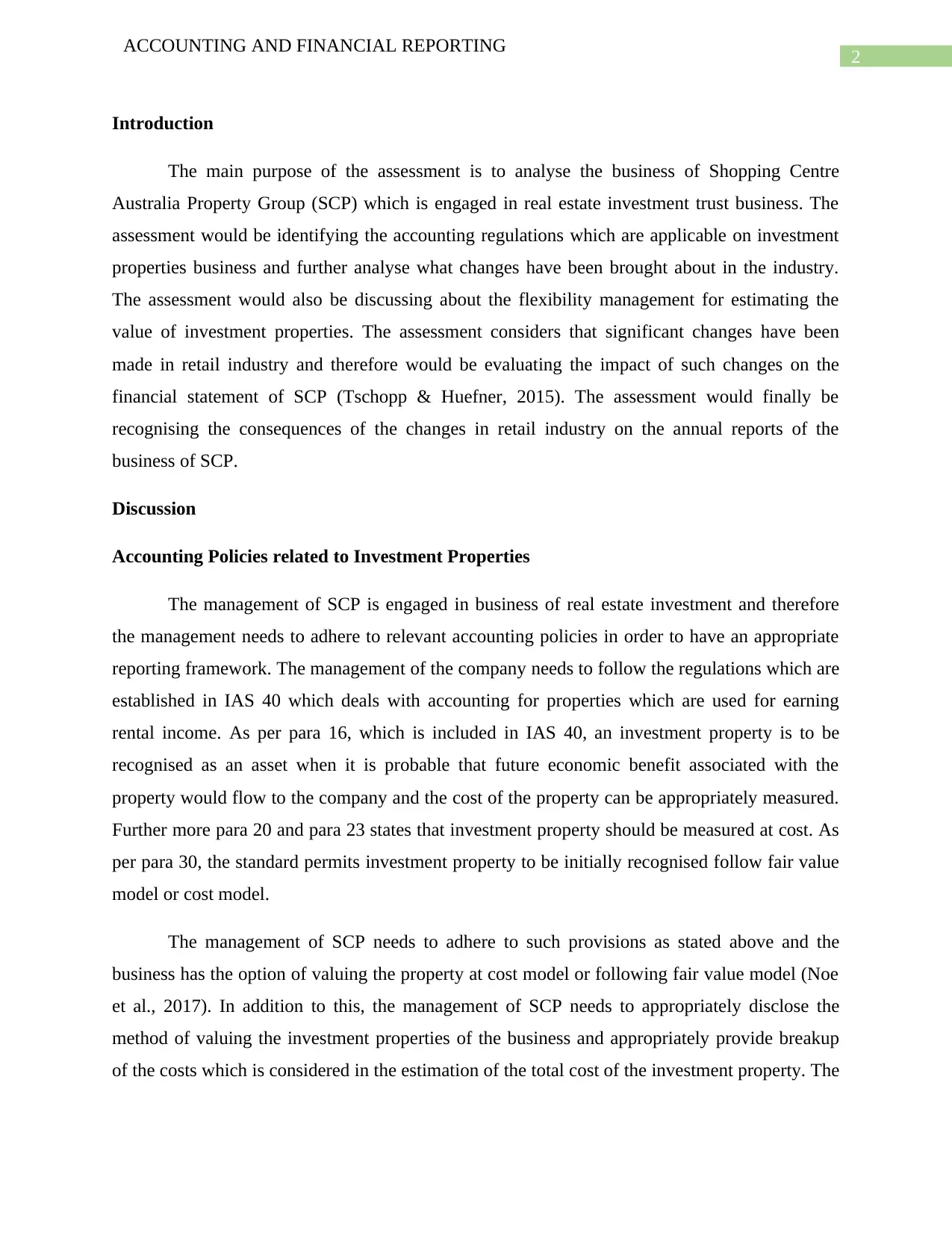
2
ACCOUNTING AND FINANCIAL REPORTING
Introduction
The main purpose of the assessment is to analyse the business of Shopping Centre
Australia Property Group (SCP) which is engaged in real estate investment trust business. The
assessment would be identifying the accounting regulations which are applicable on investment
properties business and further analyse what changes have been brought about in the industry.
The assessment would also be discussing about the flexibility management for estimating the
value of investment properties. The assessment considers that significant changes have been
made in retail industry and therefore would be evaluating the impact of such changes on the
financial statement of SCP (Tschopp & Huefner, 2015). The assessment would finally be
recognising the consequences of the changes in retail industry on the annual reports of the
business of SCP.
Discussion
Accounting Policies related to Investment Properties
The management of SCP is engaged in business of real estate investment and therefore
the management needs to adhere to relevant accounting policies in order to have an appropriate
reporting framework. The management of the company needs to follow the regulations which are
established in IAS 40 which deals with accounting for properties which are used for earning
rental income. As per para 16, which is included in IAS 40, an investment property is to be
recognised as an asset when it is probable that future economic benefit associated with the
property would flow to the company and the cost of the property can be appropriately measured.
Further more para 20 and para 23 states that investment property should be measured at cost. As
per para 30, the standard permits investment property to be initially recognised follow fair value
model or cost model.
The management of SCP needs to adhere to such provisions as stated above and the
business has the option of valuing the property at cost model or following fair value model (Noe
et al., 2017). In addition to this, the management of SCP needs to appropriately disclose the
method of valuing the investment properties of the business and appropriately provide breakup
of the costs which is considered in the estimation of the total cost of the investment property. The
ACCOUNTING AND FINANCIAL REPORTING
Introduction
The main purpose of the assessment is to analyse the business of Shopping Centre
Australia Property Group (SCP) which is engaged in real estate investment trust business. The
assessment would be identifying the accounting regulations which are applicable on investment
properties business and further analyse what changes have been brought about in the industry.
The assessment would also be discussing about the flexibility management for estimating the
value of investment properties. The assessment considers that significant changes have been
made in retail industry and therefore would be evaluating the impact of such changes on the
financial statement of SCP (Tschopp & Huefner, 2015). The assessment would finally be
recognising the consequences of the changes in retail industry on the annual reports of the
business of SCP.
Discussion
Accounting Policies related to Investment Properties
The management of SCP is engaged in business of real estate investment and therefore
the management needs to adhere to relevant accounting policies in order to have an appropriate
reporting framework. The management of the company needs to follow the regulations which are
established in IAS 40 which deals with accounting for properties which are used for earning
rental income. As per para 16, which is included in IAS 40, an investment property is to be
recognised as an asset when it is probable that future economic benefit associated with the
property would flow to the company and the cost of the property can be appropriately measured.
Further more para 20 and para 23 states that investment property should be measured at cost. As
per para 30, the standard permits investment property to be initially recognised follow fair value
model or cost model.
The management of SCP needs to adhere to such provisions as stated above and the
business has the option of valuing the property at cost model or following fair value model (Noe
et al., 2017). In addition to this, the management of SCP needs to appropriately disclose the
method of valuing the investment properties of the business and appropriately provide breakup
of the costs which is considered in the estimation of the total cost of the investment property. The
⊘ This is a preview!⊘
Do you want full access?
Subscribe today to unlock all pages.

Trusted by 1+ million students worldwide
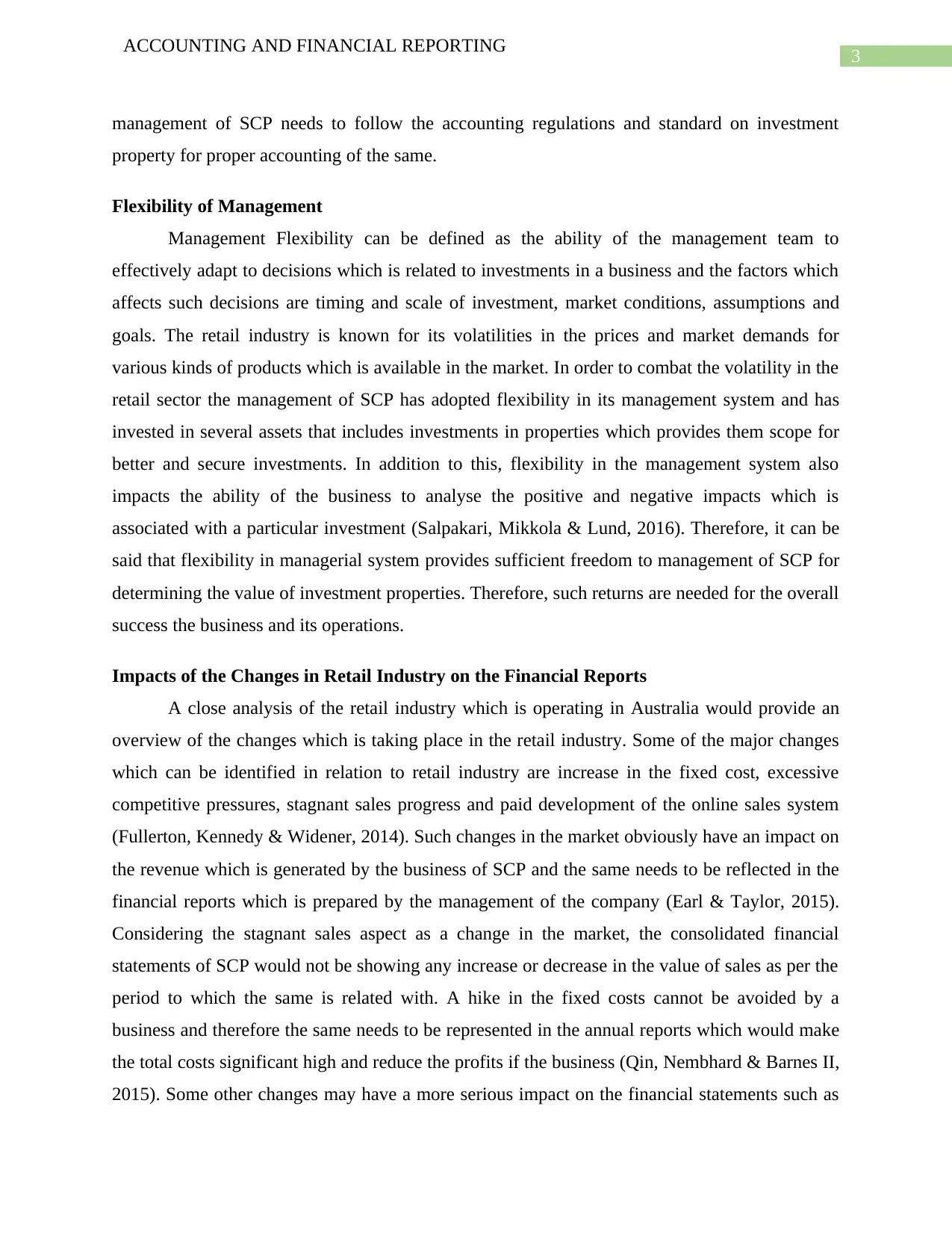
3
ACCOUNTING AND FINANCIAL REPORTING
management of SCP needs to follow the accounting regulations and standard on investment
property for proper accounting of the same.
Flexibility of Management
Management Flexibility can be defined as the ability of the management team to
effectively adapt to decisions which is related to investments in a business and the factors which
affects such decisions are timing and scale of investment, market conditions, assumptions and
goals. The retail industry is known for its volatilities in the prices and market demands for
various kinds of products which is available in the market. In order to combat the volatility in the
retail sector the management of SCP has adopted flexibility in its management system and has
invested in several assets that includes investments in properties which provides them scope for
better and secure investments. In addition to this, flexibility in the management system also
impacts the ability of the business to analyse the positive and negative impacts which is
associated with a particular investment (Salpakari, Mikkola & Lund, 2016). Therefore, it can be
said that flexibility in managerial system provides sufficient freedom to management of SCP for
determining the value of investment properties. Therefore, such returns are needed for the overall
success the business and its operations.
Impacts of the Changes in Retail Industry on the Financial Reports
A close analysis of the retail industry which is operating in Australia would provide an
overview of the changes which is taking place in the retail industry. Some of the major changes
which can be identified in relation to retail industry are increase in the fixed cost, excessive
competitive pressures, stagnant sales progress and paid development of the online sales system
(Fullerton, Kennedy & Widener, 2014). Such changes in the market obviously have an impact on
the revenue which is generated by the business of SCP and the same needs to be reflected in the
financial reports which is prepared by the management of the company (Earl & Taylor, 2015).
Considering the stagnant sales aspect as a change in the market, the consolidated financial
statements of SCP would not be showing any increase or decrease in the value of sales as per the
period to which the same is related with. A hike in the fixed costs cannot be avoided by a
business and therefore the same needs to be represented in the annual reports which would make
the total costs significant high and reduce the profits if the business (Qin, Nembhard & Barnes II,
2015). Some other changes may have a more serious impact on the financial statements such as
ACCOUNTING AND FINANCIAL REPORTING
management of SCP needs to follow the accounting regulations and standard on investment
property for proper accounting of the same.
Flexibility of Management
Management Flexibility can be defined as the ability of the management team to
effectively adapt to decisions which is related to investments in a business and the factors which
affects such decisions are timing and scale of investment, market conditions, assumptions and
goals. The retail industry is known for its volatilities in the prices and market demands for
various kinds of products which is available in the market. In order to combat the volatility in the
retail sector the management of SCP has adopted flexibility in its management system and has
invested in several assets that includes investments in properties which provides them scope for
better and secure investments. In addition to this, flexibility in the management system also
impacts the ability of the business to analyse the positive and negative impacts which is
associated with a particular investment (Salpakari, Mikkola & Lund, 2016). Therefore, it can be
said that flexibility in managerial system provides sufficient freedom to management of SCP for
determining the value of investment properties. Therefore, such returns are needed for the overall
success the business and its operations.
Impacts of the Changes in Retail Industry on the Financial Reports
A close analysis of the retail industry which is operating in Australia would provide an
overview of the changes which is taking place in the retail industry. Some of the major changes
which can be identified in relation to retail industry are increase in the fixed cost, excessive
competitive pressures, stagnant sales progress and paid development of the online sales system
(Fullerton, Kennedy & Widener, 2014). Such changes in the market obviously have an impact on
the revenue which is generated by the business of SCP and the same needs to be reflected in the
financial reports which is prepared by the management of the company (Earl & Taylor, 2015).
Considering the stagnant sales aspect as a change in the market, the consolidated financial
statements of SCP would not be showing any increase or decrease in the value of sales as per the
period to which the same is related with. A hike in the fixed costs cannot be avoided by a
business and therefore the same needs to be represented in the annual reports which would make
the total costs significant high and reduce the profits if the business (Qin, Nembhard & Barnes II,
2015). Some other changes may have a more serious impact on the financial statements such as
Paraphrase This Document
Need a fresh take? Get an instant paraphrase of this document with our AI Paraphraser
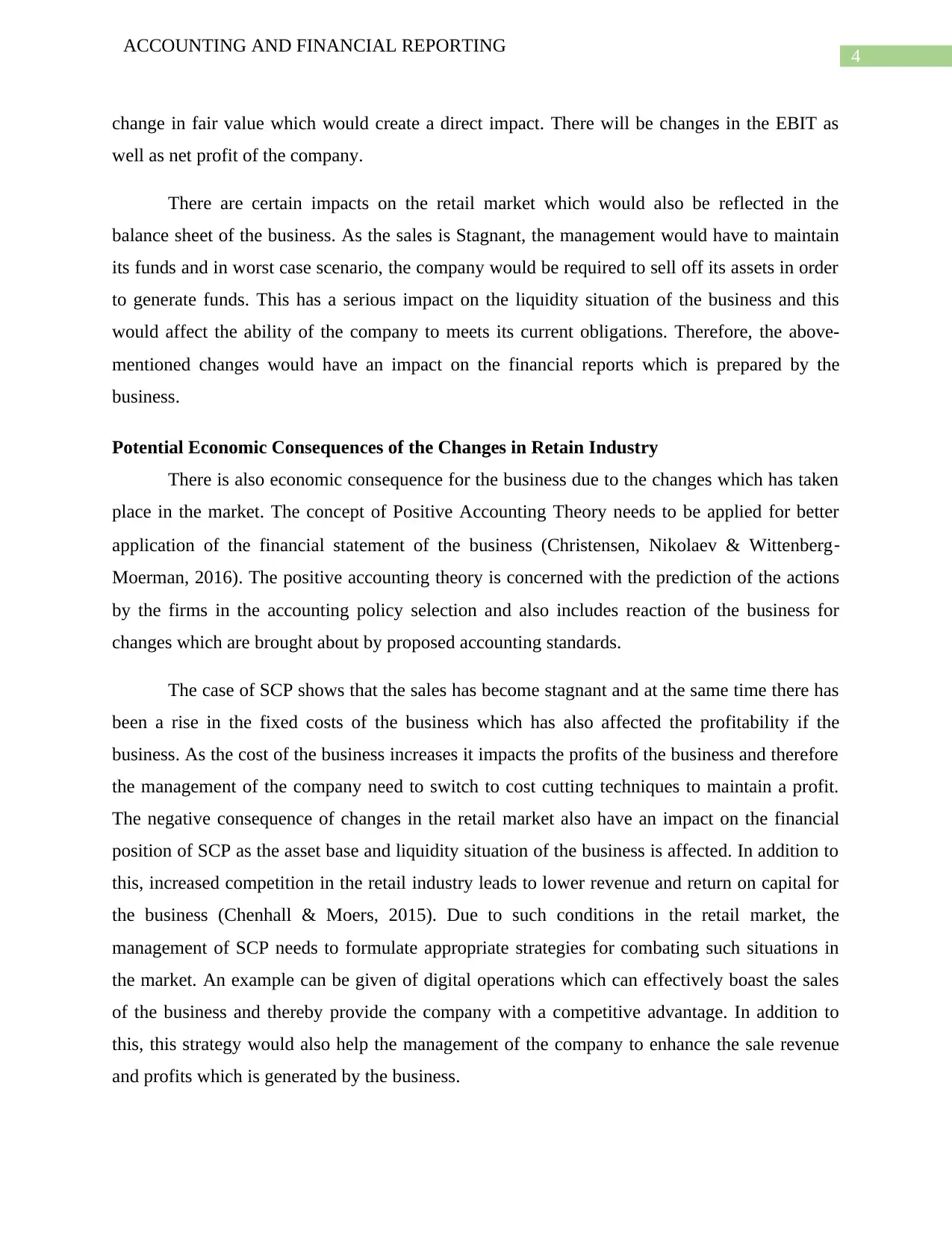
4
ACCOUNTING AND FINANCIAL REPORTING
change in fair value which would create a direct impact. There will be changes in the EBIT as
well as net profit of the company.
There are certain impacts on the retail market which would also be reflected in the
balance sheet of the business. As the sales is Stagnant, the management would have to maintain
its funds and in worst case scenario, the company would be required to sell off its assets in order
to generate funds. This has a serious impact on the liquidity situation of the business and this
would affect the ability of the company to meets its current obligations. Therefore, the above-
mentioned changes would have an impact on the financial reports which is prepared by the
business.
Potential Economic Consequences of the Changes in Retain Industry
There is also economic consequence for the business due to the changes which has taken
place in the market. The concept of Positive Accounting Theory needs to be applied for better
application of the financial statement of the business (Christensen, Nikolaev & Wittenberg‐
Moerman, 2016). The positive accounting theory is concerned with the prediction of the actions
by the firms in the accounting policy selection and also includes reaction of the business for
changes which are brought about by proposed accounting standards.
The case of SCP shows that the sales has become stagnant and at the same time there has
been a rise in the fixed costs of the business which has also affected the profitability if the
business. As the cost of the business increases it impacts the profits of the business and therefore
the management of the company need to switch to cost cutting techniques to maintain a profit.
The negative consequence of changes in the retail market also have an impact on the financial
position of SCP as the asset base and liquidity situation of the business is affected. In addition to
this, increased competition in the retail industry leads to lower revenue and return on capital for
the business (Chenhall & Moers, 2015). Due to such conditions in the retail market, the
management of SCP needs to formulate appropriate strategies for combating such situations in
the market. An example can be given of digital operations which can effectively boast the sales
of the business and thereby provide the company with a competitive advantage. In addition to
this, this strategy would also help the management of the company to enhance the sale revenue
and profits which is generated by the business.
ACCOUNTING AND FINANCIAL REPORTING
change in fair value which would create a direct impact. There will be changes in the EBIT as
well as net profit of the company.
There are certain impacts on the retail market which would also be reflected in the
balance sheet of the business. As the sales is Stagnant, the management would have to maintain
its funds and in worst case scenario, the company would be required to sell off its assets in order
to generate funds. This has a serious impact on the liquidity situation of the business and this
would affect the ability of the company to meets its current obligations. Therefore, the above-
mentioned changes would have an impact on the financial reports which is prepared by the
business.
Potential Economic Consequences of the Changes in Retain Industry
There is also economic consequence for the business due to the changes which has taken
place in the market. The concept of Positive Accounting Theory needs to be applied for better
application of the financial statement of the business (Christensen, Nikolaev & Wittenberg‐
Moerman, 2016). The positive accounting theory is concerned with the prediction of the actions
by the firms in the accounting policy selection and also includes reaction of the business for
changes which are brought about by proposed accounting standards.
The case of SCP shows that the sales has become stagnant and at the same time there has
been a rise in the fixed costs of the business which has also affected the profitability if the
business. As the cost of the business increases it impacts the profits of the business and therefore
the management of the company need to switch to cost cutting techniques to maintain a profit.
The negative consequence of changes in the retail market also have an impact on the financial
position of SCP as the asset base and liquidity situation of the business is affected. In addition to
this, increased competition in the retail industry leads to lower revenue and return on capital for
the business (Chenhall & Moers, 2015). Due to such conditions in the retail market, the
management of SCP needs to formulate appropriate strategies for combating such situations in
the market. An example can be given of digital operations which can effectively boast the sales
of the business and thereby provide the company with a competitive advantage. In addition to
this, this strategy would also help the management of the company to enhance the sale revenue
and profits which is generated by the business.
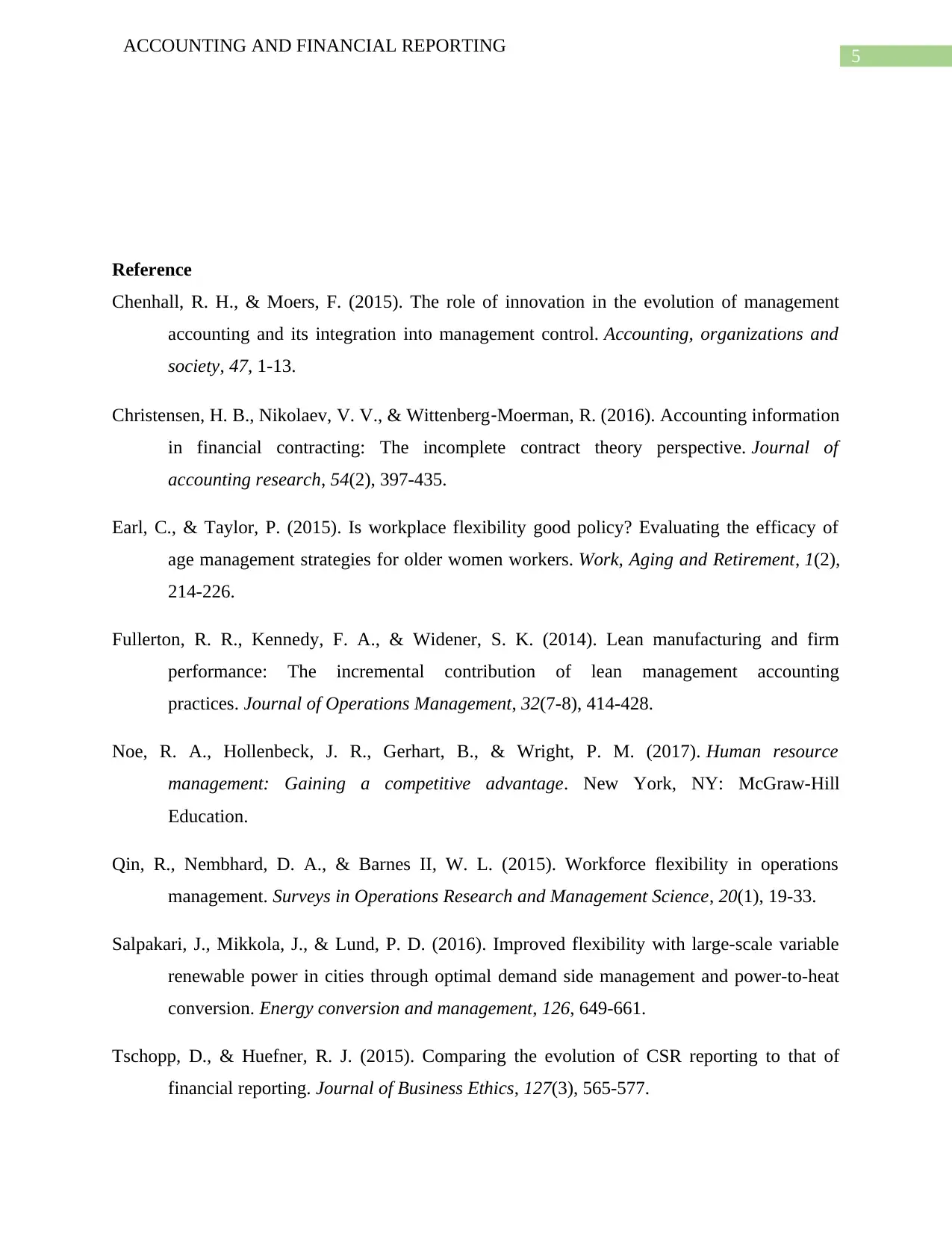
5
ACCOUNTING AND FINANCIAL REPORTING
Reference
Chenhall, R. H., & Moers, F. (2015). The role of innovation in the evolution of management
accounting and its integration into management control. Accounting, organizations and
society, 47, 1-13.
Christensen, H. B., Nikolaev, V. V., & Wittenberg‐Moerman, R. (2016). Accounting information
in financial contracting: The incomplete contract theory perspective. Journal of
accounting research, 54(2), 397-435.
Earl, C., & Taylor, P. (2015). Is workplace flexibility good policy? Evaluating the efficacy of
age management strategies for older women workers. Work, Aging and Retirement, 1(2),
214-226.
Fullerton, R. R., Kennedy, F. A., & Widener, S. K. (2014). Lean manufacturing and firm
performance: The incremental contribution of lean management accounting
practices. Journal of Operations Management, 32(7-8), 414-428.
Noe, R. A., Hollenbeck, J. R., Gerhart, B., & Wright, P. M. (2017). Human resource
management: Gaining a competitive advantage. New York, NY: McGraw-Hill
Education.
Qin, R., Nembhard, D. A., & Barnes II, W. L. (2015). Workforce flexibility in operations
management. Surveys in Operations Research and Management Science, 20(1), 19-33.
Salpakari, J., Mikkola, J., & Lund, P. D. (2016). Improved flexibility with large-scale variable
renewable power in cities through optimal demand side management and power-to-heat
conversion. Energy conversion and management, 126, 649-661.
Tschopp, D., & Huefner, R. J. (2015). Comparing the evolution of CSR reporting to that of
financial reporting. Journal of Business Ethics, 127(3), 565-577.
ACCOUNTING AND FINANCIAL REPORTING
Reference
Chenhall, R. H., & Moers, F. (2015). The role of innovation in the evolution of management
accounting and its integration into management control. Accounting, organizations and
society, 47, 1-13.
Christensen, H. B., Nikolaev, V. V., & Wittenberg‐Moerman, R. (2016). Accounting information
in financial contracting: The incomplete contract theory perspective. Journal of
accounting research, 54(2), 397-435.
Earl, C., & Taylor, P. (2015). Is workplace flexibility good policy? Evaluating the efficacy of
age management strategies for older women workers. Work, Aging and Retirement, 1(2),
214-226.
Fullerton, R. R., Kennedy, F. A., & Widener, S. K. (2014). Lean manufacturing and firm
performance: The incremental contribution of lean management accounting
practices. Journal of Operations Management, 32(7-8), 414-428.
Noe, R. A., Hollenbeck, J. R., Gerhart, B., & Wright, P. M. (2017). Human resource
management: Gaining a competitive advantage. New York, NY: McGraw-Hill
Education.
Qin, R., Nembhard, D. A., & Barnes II, W. L. (2015). Workforce flexibility in operations
management. Surveys in Operations Research and Management Science, 20(1), 19-33.
Salpakari, J., Mikkola, J., & Lund, P. D. (2016). Improved flexibility with large-scale variable
renewable power in cities through optimal demand side management and power-to-heat
conversion. Energy conversion and management, 126, 649-661.
Tschopp, D., & Huefner, R. J. (2015). Comparing the evolution of CSR reporting to that of
financial reporting. Journal of Business Ethics, 127(3), 565-577.
⊘ This is a preview!⊘
Do you want full access?
Subscribe today to unlock all pages.

Trusted by 1+ million students worldwide
1 out of 6
Related Documents
Your All-in-One AI-Powered Toolkit for Academic Success.
+13062052269
info@desklib.com
Available 24*7 on WhatsApp / Email
![[object Object]](/_next/static/media/star-bottom.7253800d.svg)
Unlock your academic potential
Copyright © 2020–2026 A2Z Services. All Rights Reserved. Developed and managed by ZUCOL.





